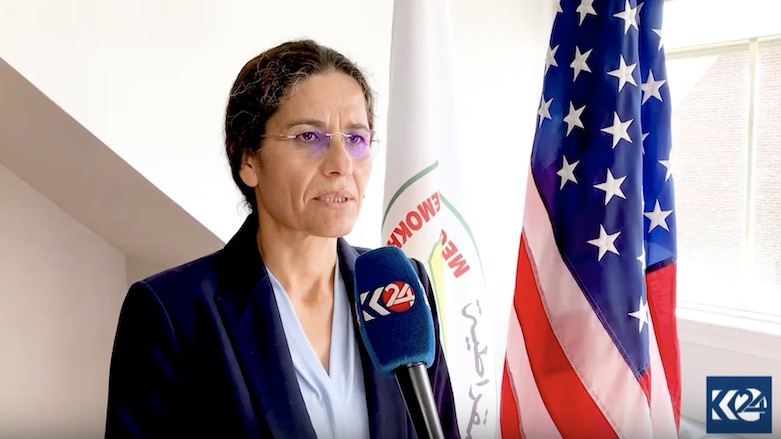SDC: New stage in Syria after defeat of ISIS

WASHINGTON DC (Kurdistan 24) – Ilham Ahmed, co-chair of the Syrian Democratic Council (SDC), explained on Wednesday that Syria was entering a new stage, following the territorial defeat of the so-called Islamic State.
With that defeat, new efforts are underway to determine Syria’s future. Earlier on Wednesday, the UN’s Special Envoy for Syria, Geir Pedersen, had announced that a Constitutional Committee had been formed, consisting of 50 government, 50 opposition, and 50 civil society members. It is to convene on Oct. 30 in Geneva.
SYRIA
Speaking at the SDC’s Washington office, Ahmed, who represents the political wing of the Kurdish-led Syrian Democratic Forces (SDF), America’s principle ally against the terrorist group in Syria, strongly objected to the way the Constitutional Committee has been formed.
“The Syrian Constitutional Committee does not include all the components of Syria. It includes the representatives of the Syrian regime,” she told Kurdistan 24. “But the forces who fought alongside the Coalition against ISIS, who sacrificed 11,000 martyrs and have had 24,000 wounded, these people are not represented in the Committee.”
Read More: Syrian Kurds protest ‘unjust’ exclusion from constitutional committee
“If that is the case,” Ahmed continued, “the committee will not be successful and will break down.”
“Also, if the current regime is reinstated, the reasons that led to the Syrian civil war will not have been addressed,” she warned, “and there will be the possibility of further unrest in the future.”
Indeed, Syrians “want a new Syria,” she explained, including the five million people living in northeastern Syria, under the autonomous self-administration there, which controls one-third of the country.
Ahmed called on the US “to recognize and consider the wishes of all sides and help make that a reality.”
She also explained that Russia had misrepresented the reason for the exclusion of the SDC from the Constitutional Committee. That is due to a Turkish veto, and the decision of others, including Moscow, to accommodate Turkey.
On Wednesday, “Russia issued some statements on the lack of SDC representation in the political process,” she told her Washington DC audience. “They accuse Washington; that Washington did not want us to be represented.”
“However, it is known that the Constitutional Committee was a result of the Sochi conference,” she continued, “and Russia is taking the Turkish veto into consideration.”
Reportedly, the Syrian regime is considering a new offensive in Idlib, the only province still under opposition control. If the regime regains control of Idlib, it will no longer be interested in negotiations, Ahmed warned.
She suggested that the “only way to prevent the division of Syria” was a “decentralized, secular system,” akin to that which the SDC has established in the northeast.
TURKEY
Ahmed revealed that there is “an indirect dialogue” with Ankara, that is being carried out through US officials—Amb. James Jeffrey, US Special Representative for Syria Engagement and Special Envoy for the Global Coalition to Defeat ISIS, as well as US military commanders in the course of their discussions with their Turkish counterparts.
“We really thank him [Jeffrey] for his efforts,” as well as the US military officers and “the Pentagon, which has also played a good role,” she said.
Ahmed emphasized that the SDF was carrying out its part of the agreement between the US and Turkey. “We implemented the first phase of the security mechanism,” she said. “We withdrew five kilometers from the border and the heavy weapons have been moved 20 kilometers away. We have also destroyed our defense fortifications on the border with Turkey.”
Asked to provide further details, she explained that the area from which the People’s Protection Units (YPG) had withdrawn was now under the control of local military councils. She expressed confidence in their ability to maintain security and prevent the reemergence of the Islamic State, as they are “trained forces.”
The military councils also work with internal security forces which also consist of local people. The internal security force “plays a big role in countering ISIS’ sleeper cells,” she said, and “there is good cooperation” between them and the military councils.
Ahmed explained that what the SDC truly wants is “real” negotiations with Turkey, as she stressed that the SDC had “the capability and strength” to conduct such talks, and it could deliver on any commitments it might make.
Nonetheless, as she noted, “Turkey is still escalating,” although “we had hoped for the opposite.” She called on the international community to press Ankara to enter into direct negotiations.
Speaking about Afrin, Ahmed described its “difficult situation,” as she explained, “Turkish forces and the rebel groups they back are involved in the kidnapping of civilians,” along with “the burning of homes and businesses.”
They are engaged “in a process of demographic change,” which includes “the Turkification of the local administrations and villages.” This indicates, she said, that the “Turkish regime intends to remain in Afrin for the long term.”
PROSECUTING ISIS FIGHTERS
Finally, Ahmed called for international backing for the criminal prosecution of Islamic State fighters—without which the victims of the terrorist organization will not have the justice that is their due.
“We, along with Syrian Arabs, and Yezidis, request the formation of an international court in northeast Syria, where ISIS fighters can be tried for their crimes,” Ahmed told Kurdistan 24.
“Western countries are afraid that if the ISIS fighters return, they will be freed quickly,” she continued. But “they should be tried here, in northeastern Syria, where they committed their crimes and there are witnesses who can testify against them.” And, then, once they have been convicted, “they can be sent back home and imprisoned in their own countries.”
(Karzan Sulaivany contributed to this report)
